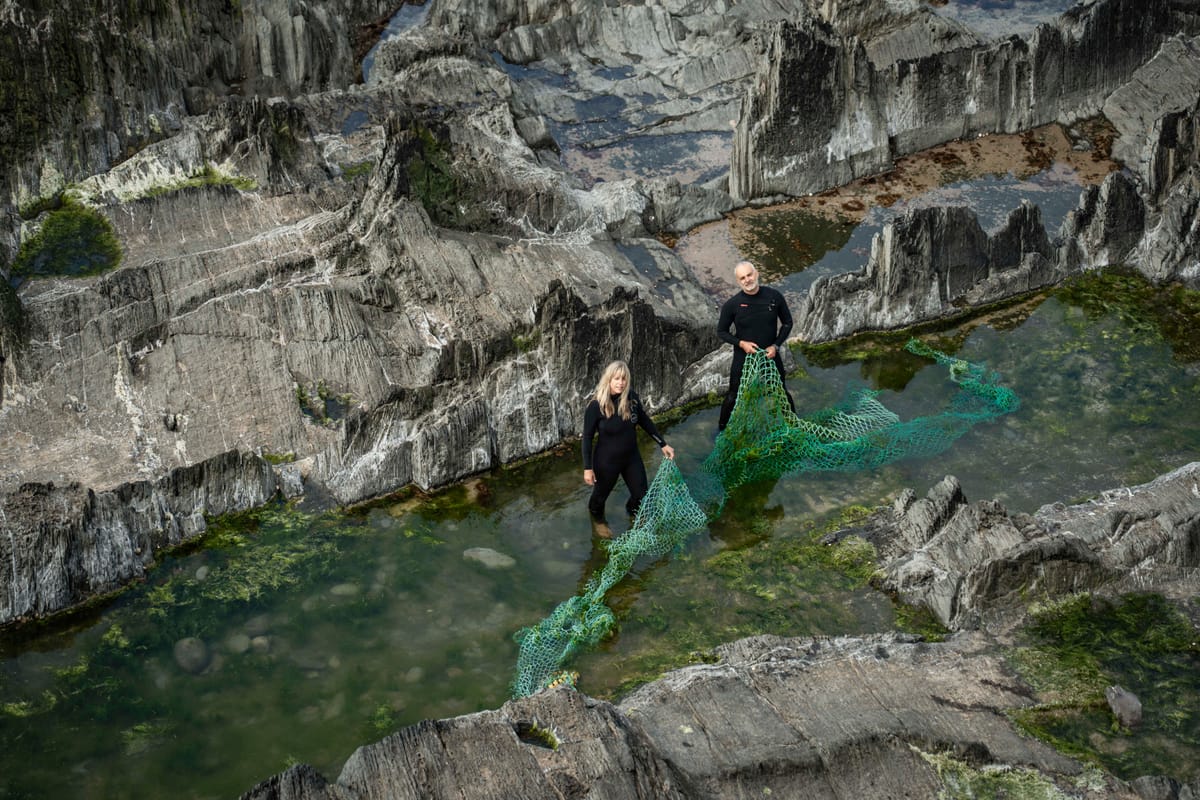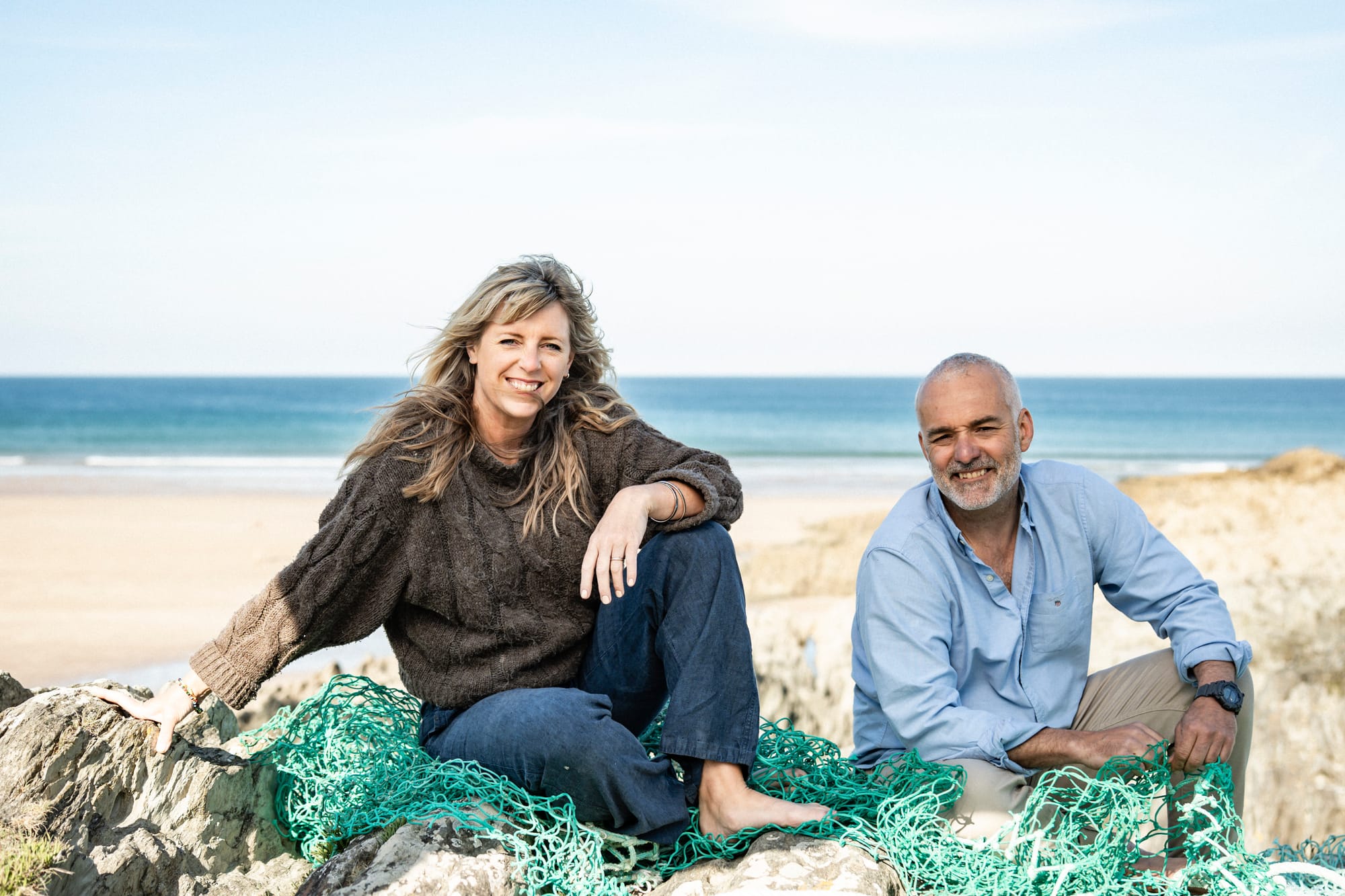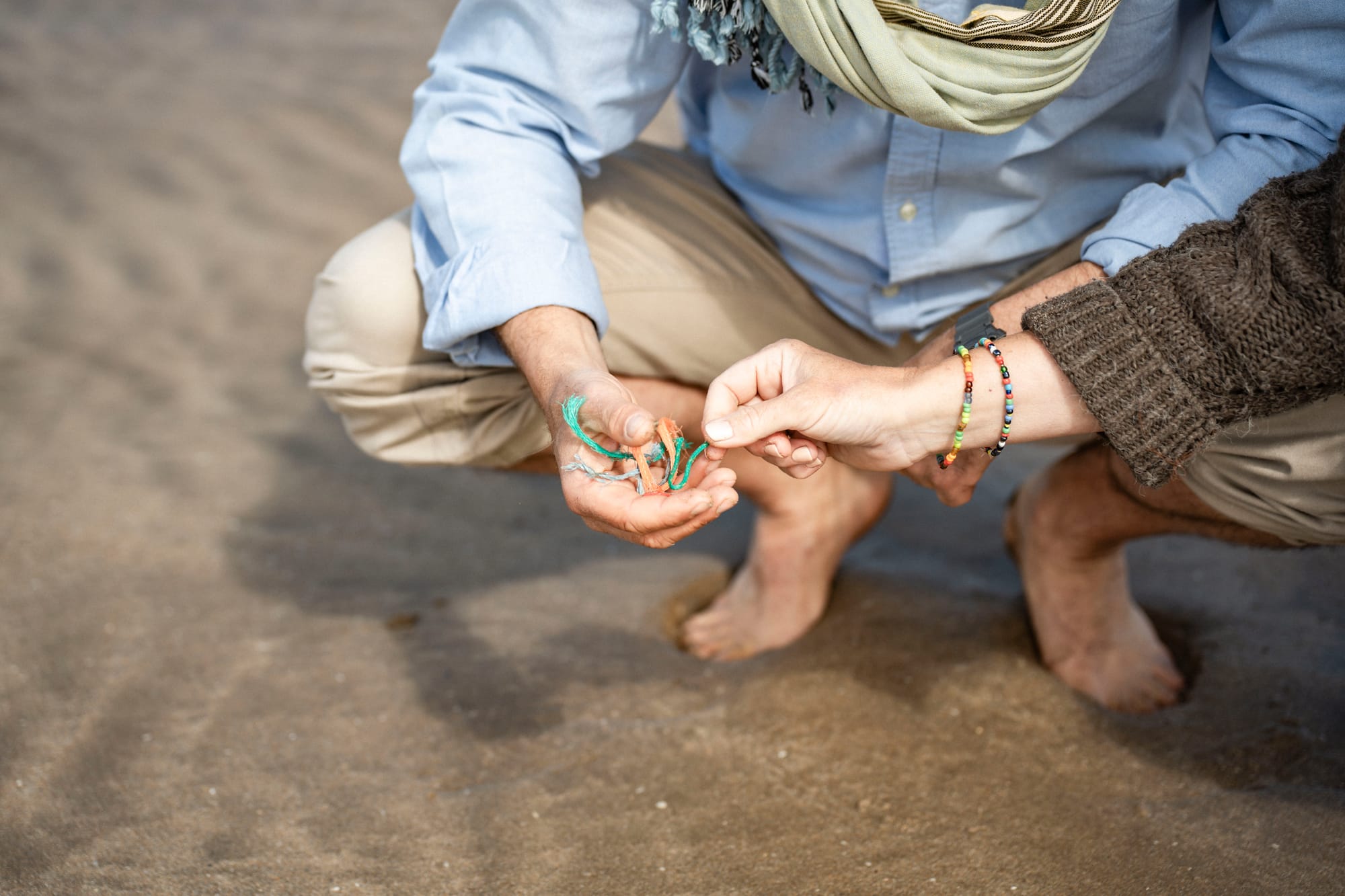
URGE always finds it inspiring when companies and creatives take a hands-on path in tackling pollution, regenerating habitats, and rethinking how things are made. Ecotribo is one of those companies, and Carrie and Tyrone Probert are two of those creatives.
URGE spoke with Carrie to understand their motives and methods better, a chance to see what the next generation of companies might look like when circularity and transparency run through everything they do, rather than being added on later.
Working with retrieved ocean plastics, the company has built a solar-powered microfactory on the North Devon coast to produce a wide variety of high-quality products, from granulate for injection moulding to finished beams and sheets.
Every product supports cleaner oceans and protects marine life.
Retrieving Ghost Nets from British Shores
Ecotribo recover ghost nets, the lost, abandoned or discarded fishing nets polluting UK waters. Buying pellets of ocean-retrieved plastic from European recyclers would have been quicker, cheaper and more predictable, Carrie tells URGE, but they “took the long view that recycling nets from British shores was necessary and a way to future-proof the business”.
Millions of tonnes of these nets are generated every year. Made from high-grade plastics, they persist for years, catching and killing indiscriminately and degrading ecosystems.
Every batch of recovered plastic is documented on Ecotribo’s website, with details of the beach clean it came from. Beach cleans often happen in partnership with Clean Ocean Sailing, the Captain Paul Watson Foundation in Scotland, Earth Action North Devon and the National Trust. They are also working with local coasteering groups, combining excursions with cleaning up hard-to-reach cliffs and caves.
You can see past beach cleans and report ghost nets for future clean-ups on Ecotribo’s website.

Reprocessing in a Solar Microfactory
“Every net we process carries a story, and we make sure that story lives on,” Carrie tells URGE.
Each product is stamped and QR-coded with its Ecotraceability® system, tracing its journey from the beach where it was collected to the moment it leaves the solar-powered workshop. The North Devon facility handles injection moulding, pressing and extrusion, giving the team full control.
Carrie sees this as a deliberate choice to stay close to the materials and the stories behind them. “We have discovered that recycling is a bit of a blunt instrument, in that quantity is the goal, which is admirable, but it leaves little room for sensitive implementation,” she says. “As storytellers from a design background, we decided that we needed to create our own workshop to have more control over the projects we want to create. Hopefully, bespoke enterprises such as ours will become more common as recyclate becomes the more desirable choice over virgin materials.”
She is also clear about the importance of openness. “Recycling tends to cover over its inadequacies - which all systems have - with informational grey areas,” she says. “Combined with big business jumping on terms such as ‘ocean-bound’ plastic, we were determined to show that recycling is genuinely something to celebrate. This takes transparency and authenticity to build trust and ultimately hope, something that we all need in the midst of multiple environmental crises.”
Watch the video explaining the technology below (or on YouTube).
Repairing and Returning Closes the Loop
All products come with a lifetime warranty and a guarantee that any returns will be repaired or recycled. Customers only cover the postage, completing what Ecotribo call a true closed-loop model.
URGE asked whether many customers have taken up that offer. Carrie says they have “only replaced a snapped carabiner so far, from a family member who was enthusiastically ‘stress testing’ it for us,” but adds that they “are genuinely open to being contacted and know that using 100 per cent pure materials, separating polypropylene from HDPE, for example, ensures lifetime recyclability.”
You can find out more about return or repair on Ecotribo’s website, keeping your product in circulation and connected to its story.
Sharing Knowledge Online and In Person
Ecotribo wants others to do what they do. "Hopefully bespoke enterprises such as ours will become more common as recyclate becomes the more desirable choice over virgin materials", Carrie says.
Ecotribo’s website hosts an Ocean Plastic Library, detailed FAQs, demonstration videos and workshop opportunities. The transparency is deliberate, showing circular design in action and encouraging others to learn.
“We are proud to demonstrate circular design in action and to share a tangible solution to a problem we are all increasingly aware of,” Carrie says. “It’s exciting to show an end product and the next step from the clean-up. So many parents jump into the story with us at our workshops, keen to hand that thread of hope to their children, to share our vision that there is hope in human creativity.
“Our pollution crises are solvable with this belief and the will to get stuck in. We look forward to the tipping point, unleashing a global movement of circular and regenerative creativity, inspiring ever greater projects and a healing planet.”
You can explore Ecotribo’s online Ocean Plastic Library to learn about the materials, book a live event, or see how recycled plastics behave in use.
You can watch an Ecotribo demo below (or on YouTube).
Collaborating for Creative Impact
Ecotribo is not just about making things, it’s about telling stories that reshape how design can engage with the environment.
That sense of purpose is expanding through new collaborations. “We are thrilled to be creating a new public art piece in Putsborough, Devon, for the World Surf Reserve,” Carrie says, “which will incorporate both our pressed and extruded materials made from ropes and nets recovered from these protected surf breaks.”
The team is also in discussion with the RHS and RNLI, exploring how to create a closed-loop system that turns their own plastic waste streams into new products. Further afield, Ecotribo has “started talks with an eco hotel to create a workshop within the hotel grounds that will make tiles and souvenirs from beach cleans, tackling both the plastic pollution issue ruining their beaches and sea, and creating creative, hopeful employment on an island with no recycling facilities.”
If you have an idea for a collaboration with Ecotribo, they have a dedicated page on their website to get in touch.
Participation
What stands out most to URGE is the way Ecotribo invites participation. You can suggest a beach clean, track a product back to a specific clean-up, explore their online Ocean Plastic Library, book a live event, return an item at the end of its life or propose a collaboration. While older, larger companies are trying to retrofit circularity, Ecotribo shows what it looks like when it’s there from the beginning, coupled with creativity and transparency.
Carrie says they are storytellers with a design background, and their story is as much about design as it is about participation, and doing things better before you do them bigger. Or maybe it is a lesson that not everything has to scale up to make an impact.
Sometimes, it just needs to open up.

Sign up for URGE Collective
A creative industries collective dedicated to system change
No spam. Unsubscribe anytime.

